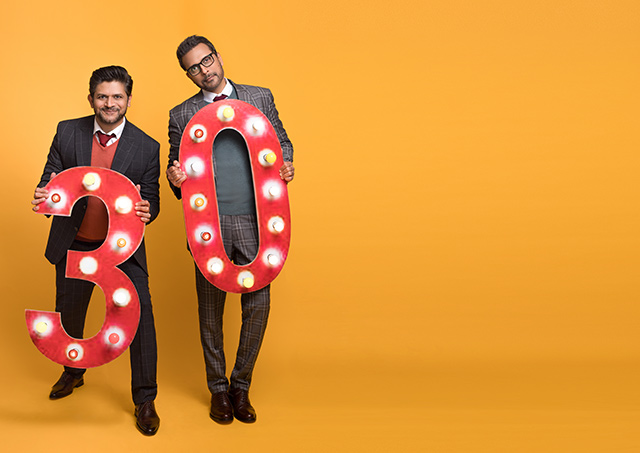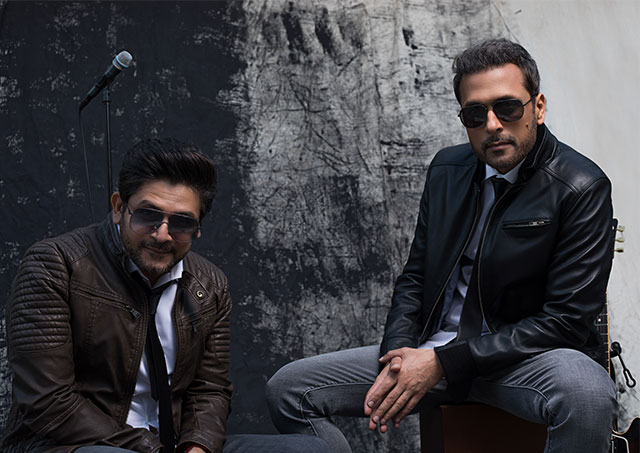
“Strings has been a consistent band for many years”
Frontrunners Bilal Maqsood and Faisal Kapadia have paved the way for newcomer artists and musicians to follow their example. They formed the hugely successful band Strings and have collectively sold nearly 25 million records worldwide. They have thoroughly entertained us with their acclaimed songs: Dhaani, Na Jaane Kyun and Yeh Hai Meri Kahani among other massive hits. As one of the few boy bands to achieve such stardom in international markets, Strings has emerged as a success story. Over the span of 30 years, we have witnessed their incredible growth and journey from newbie singers to producers in Coke Studio. Their creative talent reflects in a series of old classics revived for this generation, and loyalty is what keeps Bilal and Faisal together, as a creative duo. Inspired by eastern and western classics, their singing style is unlike that of any other artist in Pakistan.
How did the band Strings come about?
Bilal Maqsood: Faisal and I met in college in 1987. In 1988, we started making music together and at that point, we had no idea that we would end up creating a band that would become the core of our lives. A series of events prompted this happening. Vital Signs released the track Dil Dil Pakistan and many young kids wanted to be like them. The wave that came with that song led us to our path. We decided to make our band.
We already had several songs out there because of our jams and often performed at our college events. Then Musik ’89 happened, but its recording was in Islamabad and we were not present there, but then Karachi TV organized a youth festival that sought bands in the city. My father came back from that channel and explained to us how the director of the festival, Ali Rizvi, was in search of talented bands in Karachi and if we were interested to perform. We immediately agreed and that was our first appearance on television. Soon, Musik Channel’s Ghazanfar Ali contacted us and after watching us on screen, EMI approached us and wanted to produce an album. That was the foundation of our journey. Ever since, we have had six studio albums and thousands of concerts.
How do you feel when people interpret and relate to your songs?
BM: The love and affection we have received is immense, and we cannot thank God enough for that. The interesting thing with Strings is that we have remained relevant since our first album. Our fan following is not limited to one age group. Whether they are fans of Sar Kiye Yeh Pahaar, the Musik Channel eras, or people who love songs such as Jab Say Tumko and Aye Meri Sar Zameen, the age group is diverse. In fact, fans of Sajni were not born yet when we released the song Duur. So, it is overwhelming to realise that everyone appreciates our hard work spanning more than 30 years. While performing at concerts, we have witnessed that a 40-year-old enjoys our music as much as a 15-year-old teenager. It feels good because very few people have had the same kind of success as Strings.

“The interesting thing with Strings is that we have remained relevant since our first album. Our fan following is not limited to one age group.”
Strings was the producer of Coke Studio for three years. Was it a different creative space? What did you learn from that experience?
BM: As a band, you produce certain kinds of music. You have a decent fan following too and people expect certain types of sounds from you. The songs by Strings originate from the music of Strings but that does not imply that we are confined to that kind of music only. There is so much more in us that we can do, and we always wanted an avenue where we could explore everything inside us. We got that from Coke Studio. Prior to that, we explored a different music style in the film Moor, that was quite unlike Strings.
Thereafter, we signed a contract with Coke Studio where our creative space was intact and limitless. We could experiment with any genre, style or artist. It was a lot of fun and a priceless learning experience as we got the chance to work alongside legendary artists Abida Parveen, Raees Khan sahab and Rahat Fateh Ali Khan, among other amazing musicians. As a group, you learn and evolve every day. You study your surroundings and if you are true to your art, you are sensitive to the people around you. We could not have learned better from Coke Studio than our personal experiences surpassing 40 years. After its success, we felt complete and developed an understanding about life, people and music.
Which song has been the most enjoyable to work on in your career?
BM: When we are working on a song, I never seem to enjoy its process. I am sure Faisal feels the same. There is a lot of tension and stress to get things right. Making sure what you have in mind replicates on tape is a trial. You are tweaking the tracks and instruments all the time. Once that process concludes, it is a different ball game. The face of the song can change completely. This is work for us but once it is done, we feel relieved. We sit together, listen to the song and enjoy it. While working on a song, we are so deeply into it that we don’t see anything clearly. We focus on our work only. At least, that is how it is with us.

Your thoughts on recreating classical, old soul music?
BM: It is important to recreate classical music, which is why we chose to do it in Coke Studio. However, it must be done tastefully. Preserving the sanctity of the song is crucial. The whole idea is to make it relevant to the younger audience that may have never heard it before. The techniques and sounds today are completely different, so the newly recorded song with slight changes will fascinate youngsters. Recreating is the revival of songs that are an integral part of our artistic history. It is better that people hear them again and not neglect classics entirely. It gives new meaning to most songs. I believe that reprised versions of old music is a good thing.
Do you ever feel challenged in the music industry by your counterparts?
Faisal Kapadia: More than our counterparts, we feel challenged because of the music industry. It has become more difficult today. Whether they are Pakistani or Indian musicians, pop singers feel confronted when they try to distribute their music. We don’t find ourselves in a battle with other musicians as our music realm is very small. It unsettles us to think how we can use social media platforms to reach our fans because everything is changing so fast. The label concept and physical distribution of the album is long gone. We are seeking different methods to reach out to the masses and it is going to be a constant struggle.
What factors have led to the success of Strings?
FK: Many things have added to our band’s success but if you ask both of us, it is the loyalty. We are loyal to each other and Strings. Our band is our ultimate priority, even before ourselves. We are very straightforward with each other, and dedicated to our label. If we are intact and together, so is our band. The other thing is consistency. We have been consistent with our work for the past 30 years. Of course, success does not come easy with every project, but consistency will bring you closer to it.

“After 10 years, Strings is working on a new album. It is very thrilling for us!”
How have you influenced Pakistan through music?
FK: It is slightly weird for us to comment on how we have influenced Pakistan’s music industry. I am sure we must have struck a chord with the listeners as our band has been making music for three decades now, in different eras and for different age groups. We have represented Pakistan on major international platforms and in many countries. I am sure there is some influence in the mix. Young musicians could learn from the success story of our loyal and committed band.
Complete the sentence: “Music is…”
FK: For us, music is 365. I say that because music is all day, every day in our lives. Either we are working on music, talking about it or listening to it, so I would say music is 365.
Are you planning to resurrect Strings?
FK: Interesting question because Strings has always been there. We have never made any efforts in keeping it alive or bringing it back. It has been a consistent band for many years. We worked on Duur in 1999 and have not stopped since. Our dominant role may have changed, as it did in Coke Studio where we were entirely behind the scenes. That was a conscious decision. We wanted to concentrate on that project only, so we were away from the mainstream for those four years, actively making music. Bilal and I are now back to our roots.
What other projects are in progress?
FK: 2019 is a very exciting year for us. Last year we completed our 30 years in the industry, and it is still ongoing as part of the 30-years campaign. Although the band is now 31, we are planning concerts and travel. We have started producing new music, and released six music videos last year including Sajni, Urr Jaun, Piya Re, Mil Gaya, Hum Dono and Chal Para. Probably after 10 years, Strings is working on a new album. It is very thrilling for us! We see ourselves touring and performing as much as possible in the coming months.

Who would you cite as your musical influences?
FK: Musical influences are always changing with time. I still remember when Bilal and I formed Strings our musical influences were similar. During Bilal’s childhood, eastern classical music, RD Burman, Kishore Kumar and Pakistan’s semi-classical music were his inspiration. I heard the same kind of music, too. When we began working together, U2 and Colplay had immense influence on us. Like I said, things change over time and new musicians emerge. Whether they are young or old, if they have something good to offer, it can inspire you. Our experience at Coke Studio is a source of inspiration and will continue to be in our current music. Even if people don’t see it, we know how much knowledge and depth we have gained from Coke Studio.
If you were not singers or producers, what would you be today?
FK: We often talk about this. Bilal says that he would have been a banker. Now that I think of it, he wouldn’t have been in that profession. Maybe he would have been a painter or an artist. I would have assumed my father’s business. Life would have been very different if we were not singers but more than 60 to 70 percent of our life span has been in music. We are 47-years-old now. Two-thirds of our lives has been dedicated to this field!
Do celebrities have a social responsibility? If so, what is it?
FK: Absolutely – celebrities have huge social responsibilities. People watch and follow their actions. Their first responsibility is that their actions should be socially and morally right, as they influence others. People look up to you as an idol. In fact, celebrities should go out of their way to do something valuable for the society because they have the power to reach out to people easily. It is their duty to use that power to convey useful messages and lessons to the society.
If fans could remember you for one thing, what would that be?
FK: Well, only fans can answer this question. It is tough for us to say what they like. However, their interaction through our social media suggests that we are humble and that is the best thing we have ever heard because humility is the most important attribute one can have.
What is your signature song?
FK: Sar Kiye Yeh Pahaar – it is our signature song and what Strings gets recognized for the most. Even after 26 years of its release, people always seem to cheer for this song. They demand that we sing it, and that says a lot. It is still one of the most powerful tracks by Strings and it is great to see it live on in peoples’ hearts.
What lacks in Pakistan’s music today?
FK: In 2006-2007, Pakistan’s music industry was at its peak. At the time, there was proper infrastructure of music platforms. We had four dedicated music channels, and five to six radio channels that supported Pakistani music. You have musicians in one place to create music, platforms to distribute it and an audience to listen to it. These three elements were there back then. Post 2008, the distribution platforms crashed, and three of the four music channels shut down. The remaining began to play international music and Bollywood songs. They stopped airing Pakistani music completely.
Although the musician is still there, his music is not reaching the audience. As a result, people stopped listening to Pakistani music because there was no music. This troublesome factor caused Pakistan’s music industry to suffer. Now, in 2018-2019, we have witnessed its revival, thanks to social media – YouTube and streaming websites like Patari, iTunes, Apple music, Spotify, and Saavan.
There are talented musicians in our country but the problem lies in a dearth of distributing platforms. People need to understand and become acquainted with new platforms in order for music to reach them seamlessly. There are no more CDs, TV or radio channels supporting Pakistani music.

Who do you think is a rising singer in Pakistan today? Your reason(s)?
FK: There are many. It is difficult for people to distribute their music or get the recognition they deserve. Some artists are working hard and it is benefitting them too. They are achieving their goals slowly but they are getting there. People like Asim Azhar and Uzair Jaswal have been working hard for so many years. Ali Sethi, Aima Baig and Momina Mustehsan are doing really well! They have already risen to the top. They are no longer ‘rising stars’. They are there because of their hard work and consistency. They have worked nonstop to be where they are right now.
Have you made any regretful decisions in life?
FK: I suppose there aren’t any regretful decisions as such, except wrong decisions, which we don’t feel remorse for. Both of us have an advantage; when making a decision, we talk about it and discuss it together. Sometimes one of us makes a poor choice but if the other one is wrong too, it is a sound judgement on our part. We don’t cry over it. Instead, we learn from it with confidence.
Do you believe that things happen to you for the best?
FK: I absolutely believe that everything happens for the best. Sometimes things may go awry but one must persevere. Bilal and I often tell each other that things could have been a lot worse so let’s just move forward. This mantra only brings optimism to our future in music.
INTERVIEW: HAIDER RIFAAT
STYLING: RAO ALI KHAN
PHOTOGRAPHS: Jaffer Hassan![]()











































